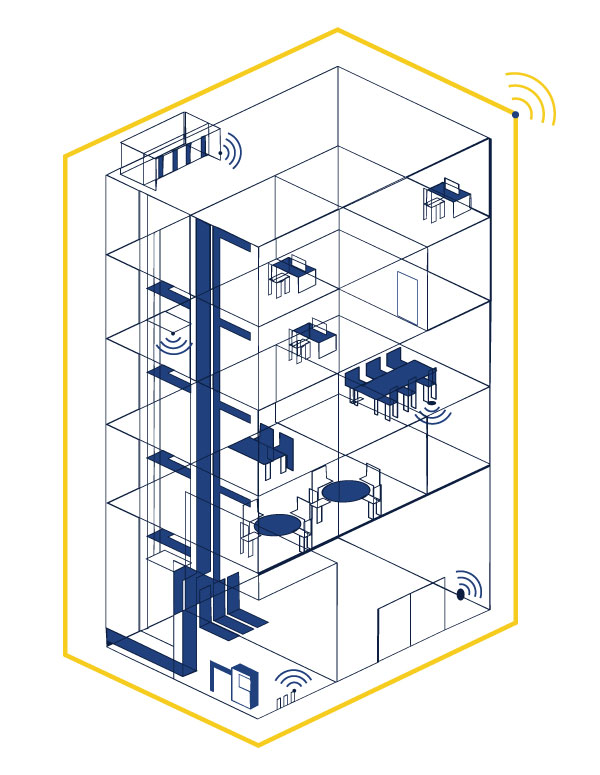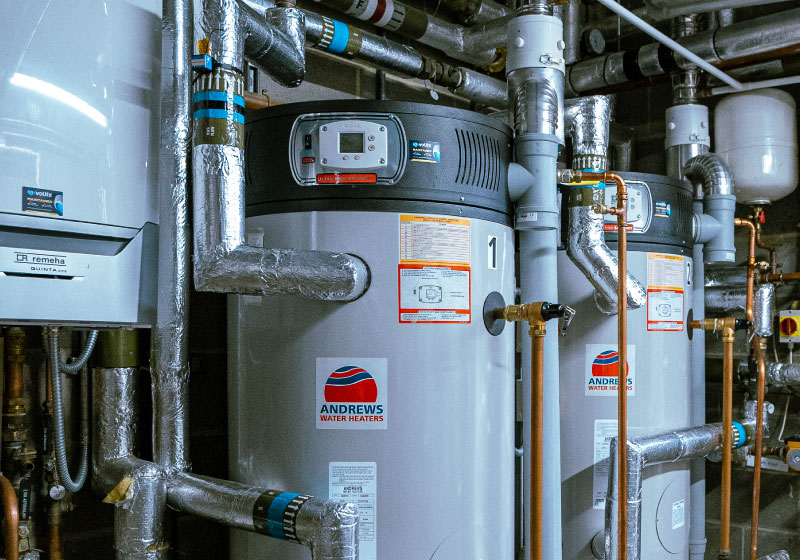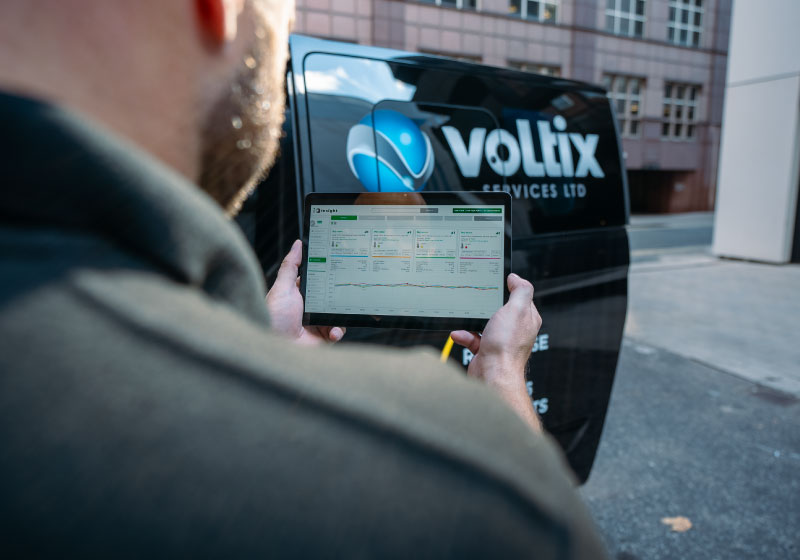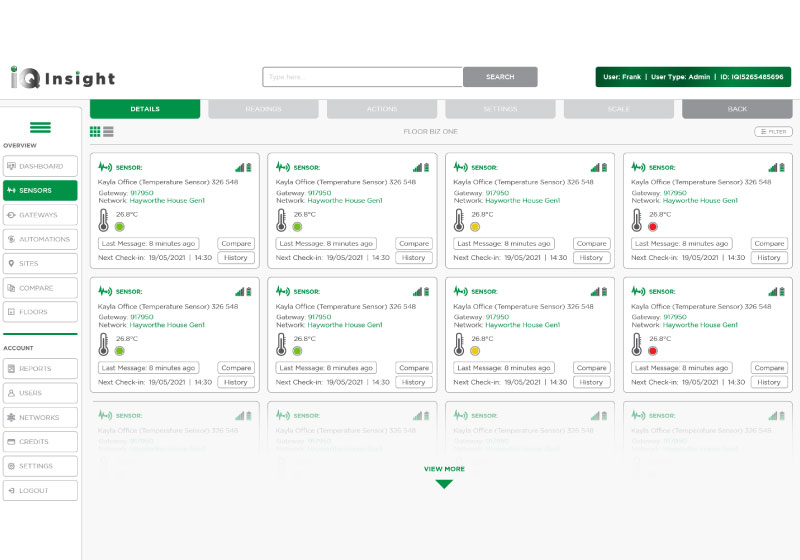Wireless Sensors for Smart Insights
IoT and smart buildings are becoming the norm for businesses and commercial real estate portfolios. System faults and failures, water leaks and further issues don’t stick to 9-5 schedules. Connected buildings streamline management and operate more efficiently, which is particularly important for facilities maintenance.
Tapping into the power of real-time data holds extensive benefits for businesses. From powerful predictive capabilities to expedited interventions and advanced long-term strategy, less is left to chance. The Voltix Services team uses strategically placed IoT sensors for live building and equipment monitoring. We get alerts whenever there are unusual readings, which means we can intervene ASAP to minimise damage and cost – and prevent downtime. This drives precision maintenance and significantly reduces risk.

IoT for Smart Buildings
Wireless Sensors
Sensors and devices are installed throughout the facility to monitor a range of metrics, including:
- Temperature and humidity
- Energy consumption
- Equipment status
- Occupancy levels
- Air quality
- Flood and leak detection
- Vibration

Data Collection and Analytics
Using the internet or a local network, data is collected and transmitted to other sensors, devices and central management systems. These cloud-based platforms enable real-time data analysis for instant interventions and long-term, data-driven strategies.

Centralised Smart Building Management
Centralised dashboards are a hub from which we monitor the status of all connected devices, receive alerts and manage maintenance activities. The Voltix Services team sets pre-defined conditions based on specific focus areas. Whenever the IoT wireless sensors detect undesirable deviations from the norm, an automatic alert is triggered. This allows for immediate interventions that can avoid or minimise damage and costs.

Wireless Sensors
Sensors and devices are installed throughout the facility to monitor a range of metrics, including:
- Temperature and humidity
- Energy consumption
- Equipment status
- Occupancy levels
- Air quality
- Flood and leak detection
- Vibration

Data Collection and Analytics
Using the internet or a local network, data is collected and transmitted to other sensors, devices and central management systems. These cloud-based platforms enable real-time data analysis for instant interventions and long-term, data-driven strategies.

Centralised Smart Building Management
Centralised dashboards are a hub from which we monitor the status of all connected devices, receive alerts and manage maintenance activities. The Voltix Services team sets pre-defined conditions based on specific focus areas. Whenever the IoT wireless sensors detect undesirable deviations from the norm, an automatic alert is triggered. This allows for immediate interventions that can avoid or minimise damage and costs.

Our Top Wireless Sensors
Wireless sensor for monitoring and optimising heating and cooling in any space.
Versatile sensor with probe for accurate monitoring across most applications.
Tracks the status and performance of assets, machinery, or building components.
Converts gas, electricity and water meters into smart meters with live readings.
Compact sensor that provides fast and reliable flood or leak detection.
Flexible sensor designed to detect water leaks along extended areas.
Monitors humidity to maintain comfort, wellbeing and healthy indoor conditions.
Measures particles with CO and CO₂ monitoring for compliant indoor air quality.
Detects CO levels to prevent health risks and ensure compliance standards.
Monitors CO₂ levels to support healthy ventilation and safe occupancy rates.
Detects movement for added security, particularly in vacant or low-use areas.
3-in-1 device combining motion, temperature and humidity monitoring in one unit.
Detects unusual vibrations for early fault detection and condition-based maintenance.
Monitor power supply and use current-use data to gauge machine health, performance and sub-metering.
Smart Buildings, Condition-Based Maintenance and Precision Management
Smart building technology has revolutionised the management of even complex, multi-site commercial buildings and, with it, the tenant experience. The data collected by IoT and smart buildings provide full transparency for landlords, as well as compliance reporting.
These innovations support precision maintenance with a considerable reduction in risk, guesswork and the time and cost of manual processes. Real-time data insights into system performance empower early fault detection and optimal maintenance of critical building systems. Together with smart meters and AMI, these connected environments are geared towards greater efficiency, cost-effectiveness and resilience.
IoT Wireless Sensors Benefits
Enhanced Operational Efficiency
Monitor equipment and building conditions in real time to respond quickly to issues. Predict failures before they happen to reduce downtime and repair costs.
Control energy use with smart sensors and automated systems that adjust heating, cooling and lighting based on occupancy and usage patterns.
Space Utilisation
Gather occupancy data to understand how spaces are used. Reallocate resources and redesign layouts to make better use of available areas.
Control lighting, temperature and air quality for each room or user. Maintain healthy conditions that improve comfort and boost workplace productivity.
Asset Management
Track valuable equipment with IoT devices. Automate inventory management to maintain correct stock levels and reduce equipment losses.
Utilise analytics tools to transform operational data into actionable insights. Support smarter planning and better-informed business decisions.
Sustainability
Track energy and resource use to lower carbon footprint. Meet sustainability regulations while improving environmental performance.
Access and control facility systems from any location. Stay connected with mobile and remote monitoring at all times.
Keep Your Building Smarter, Safer and Cost-Efficient
Hear From Our Facilities Maintenance Clients
“We would consider Voltix Services our partner in providing our client with well thought out, practical IoT solutions that add a lot of value.”
Frequently Asked Questions
How IoT sensors support facilities maintenance.
What is IoT for Facilities Maintenance?
The Internet of Things (IoT) for facilities maintenance refers to the integration of connected devices and systems within a facility to streamline and optimise maintenance tasks. This approach leverages advanced sensors, software and connectivity to monitor, manage and maintain various aspects of a building or facility. These wireless sensors also form an essential part of smart buildings.
How do wireless sensors benefit facilities maintenance?
Wireless sensors have the ability to monitor an extensive range of metrics, creating scope for whole-operations benefits. Among these benefits, IoT smart sensors:
- Enable predictive and condition-based maintenance.
- Reduce unexpected equipment failures.
- Lower operational and energy costs.
- Support compliance with health, safety and environmental standards.
- Improve occupant comfort and safety through proactive monitoring.
What types of data can IoT sensors collect?
At Voltix Services, we utilise the functionality of wireless IoT sensors and devices to provide insights into critical systems in innovative ways. Some of the primary data sets we concentrate on include:
- Energy usage (electricity, gas, water, heat)
- Environmental conditions (temperature, humidity, air quality, carbon dioxide and carbon monoxide)
- Equipment performance (vibration, pressure, flow, noise levels)
- Occupancy and space utilisation
- Flood and leak detection (water, gas)
- Safety monitoring (smoke, fire, Legionella risk in water systems)
Do the sensors require regular maintenance?
Very little. Most wireless sensors have long-lasting batteries. Facilities teams should include them in regular inspections, replace batteries when required and ensure connectivity is maintained.
Can IoT sensors integrate with existing building management systems?
Yes. Modern IoT platforms are designed to integrate with legacy Building Management Systems (BMS) and Computer-Aided Facilities Management (CAFM) software, ensuring a unified view of building operations without the need to replace existing systems.
What buildings can benefit most from IoT sensors?
- Commercial offices and business parks
- Healthcare (hospitals, clinics, care homes)
- Education (universities, schools and academies)
- Retail and hospitality
- Industrial and manufacturing sites
- Data centres and critical infrastructure
- Decommissioned, mothballed and vacant buildings
How do IoT sensors improve ESG and sustainability performance?
By providing granular data on energy, water and emissions, sensors help organisations reduce waste, optimise HVAC systems, lower carbon footprints and support data-level benchmarking and reporting.
Are IoT wireless sensors secure?
Yes, when installed with encryption and secure data transmission protocols. Facilities teams should choose providers that comply with UK GDPR and ISO 27001 standards to ensure data integrity and privacy.
What is the typical cost of implementing IoT sensors in facilities maintenance?
Costs vary depending on scale and application. A small deployment (e.g., water leak detection or room temperature monitoring) is relatively low-cost, while full-building monitoring may require a larger investment. However, savings from reduced downtime, energy efficiency and compliance avoidance often outweigh upfront costs.
Can IoT wireless sensors support remote facilities management?
Absolutely. Data can be accessed via secure cloud dashboards and mobile apps, enabling facilities teams to monitor multiple buildings and respond to issues in real time, reducing the need for on-site presence and manual checks and processes.
Work with Voltix Services for Advanced Remote Building Monitoring for Maintenance
IoT and smart buildings for maintenance are the most powerful way to optimise building maintenance and management and optimise systems and operations. Speak to our team about the best wireless sensors for your priority areas and explore the benefits.
